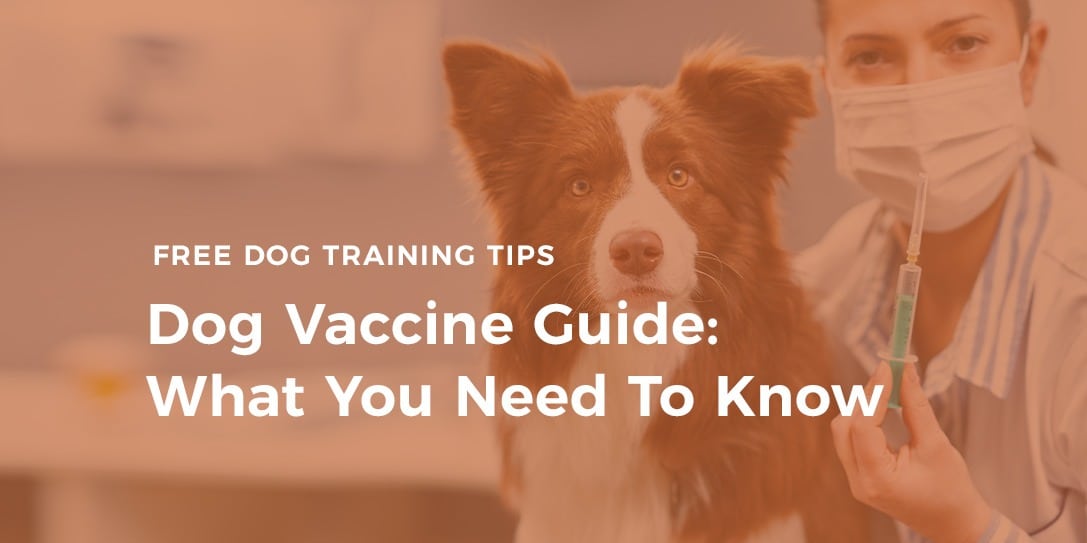
Ever Wonder Which Vaccines Your Dog Needs and Why? Here’s Your Answer.
As a pet owner, one of the best ways to ensure your four-legged friend stays healthy and happy for years to come is by staying up to date with dog vaccine requirements and recommendations.
These vaccines can help protect your pooch from mild to severe diseases. But, with so many different vaccinations available and an overwhelming amount of information on the web, it can be hard to know which vaccines your dog needs and when to get them.
For that reason, we put together a complete guide to dog vaccines. Whether you just got a new pup or need a refresher, we have gathered all the information that every owner should know about vaccinating their dog.
Understanding Vaccines for Dogs: What Are They and How Do They Work?
Vaccines help your dog’s immune system fight off certain diseases. They work by introducing a harmless, small amount of a disease-causing agent known as an antigen into your dog’s body. This triggers their immune system to produce antibodies to fight off the antigen. That way, if your dog is exposed to the disease in the future, its immune system will recognize it and be better equipped to fight it off entirely or minimize the intensity of the illness.
Do Dogs Really Need Vaccines?
Like humans, dogs need a series of vaccines at a young age and annual shots to protect their health. Not vaccinating your dog can increase their risk of contracting dangerous and potentially fatal illnesses that can be spread through contact with other animals and humans. For example, most deaths caused by canine parvovirus happen within the first 48 to 72 hours after symptoms start. However, a tiny needle prick, in addition to good hygiene, can avoid the unthinkable.
 The Core Vaccines That All Dogs Need
The Core Vaccines That All Dogs Need
So, let’s look at the different types of vaccines for dogs, the ones you should consider, and those that are often required.
According to the American Animal Hospital Association (AAHA), “core” vaccines are recommended for all dogs regardless of their environment or lifestyle to safeguard against potentially deadly illnesses. These vaccines include:
- Canine distemper virus (CDV)
- Canine adenovirus (CAV)
- Canine parvovirus
- Rabies
Which Dog Vaccines May Also Be Recommended or Required?
Non-core vaccines are typically voluntary, but they may be required or recommended depending on where you live. We recommend consulting your vet about which non-core vaccinations are right for your dog. The AAHA includes the following vaccines on its non-core list:
- Leptospira
- Borrelia burgdorferi (canine Lyme disease)
- Bordetella bronchiseptica and canine parainfluenza virus
- Bordetella bronchiseptica
- Canine influenza virus-H3N8/H3N2
- Crotalus atrox (Western diamondback rattlesnake venom antigen)
Our Dog Gone Vaccination Checklist
Doggy daycare, grooming, and training facilities, including Dog Gone Amazing, also require dogs to be vaccinated to keep all our furry friends here healthy and safe. At Dog Gone Amazing, our vaccination checklist includes the following:
- Bordatella/kennel cough
- Rabies
- Parvovirus
- Parainfluenza
- Adenovirus
These vaccines need to be administered before coming to our facility. Vaccines must be given at least seven days before arrival at our Reno dog training facility to be up to date.
 How often should my dog’s vaccines be boosted?
How often should my dog’s vaccines be boosted?
Dogs should be boosted every three years with their core vaccines. The first rabies vaccine is effective for one year, and any rabies vaccine after the first year will last for three years.
How long do vaccines take to become active?
The time it takes for a vaccine to take effect can vary depending on its type and the dog’s immune system.
Although walking right when your puppy comes home may be tempting, completing the entire vaccination series and following the recommended waiting period is crucial to provide complete protection for your pet. Most vaccines require two weeks to take effect, and the rabies vaccine takes about 28 days.
What Dog Vaccine Should My Pup Get At What Age?
The AAHA and other veterinary experts recommend vaccinating your dog for different diseases at different ages.
3 Weeks Old: Bordetella
Puppies at risk due to their environment may receive a Bordetella vaccine as young as three weeks old. The current recommendation is to administer this vaccine at 6 to 8 weeks of age.
Ages 6 to 16 Weeks Old: Core vaccines
At 6 to 8 weeks of age, your puppy will receive their first round of core vaccines. At least three doses of a combination vaccine between 6 and 16 weeks of age should be administered about two to four weeks apart. In Nevada, every dog 12 weeks of age must have a rabies vaccine.
Although we have outlined the typical vaccination schedule, visiting your veterinarian once a year is best to ensure your pup is current on all vaccinations.
Once your puppy has completed its vaccinations and the waiting period has passed, it’s time to get out and learn something new! We offer a variety of puppy training packages that will help create a strong foundation and set your dog up for good health and great behavior.
